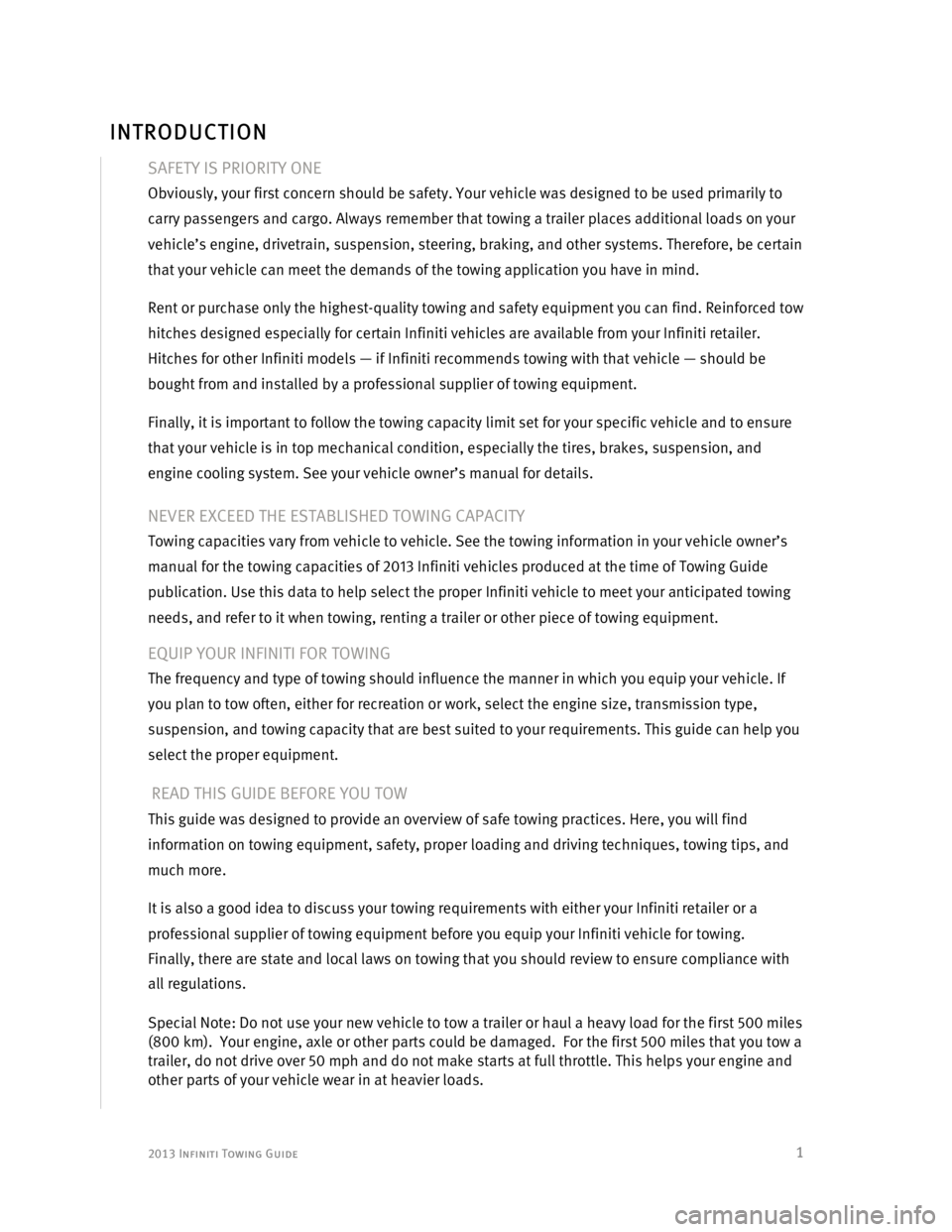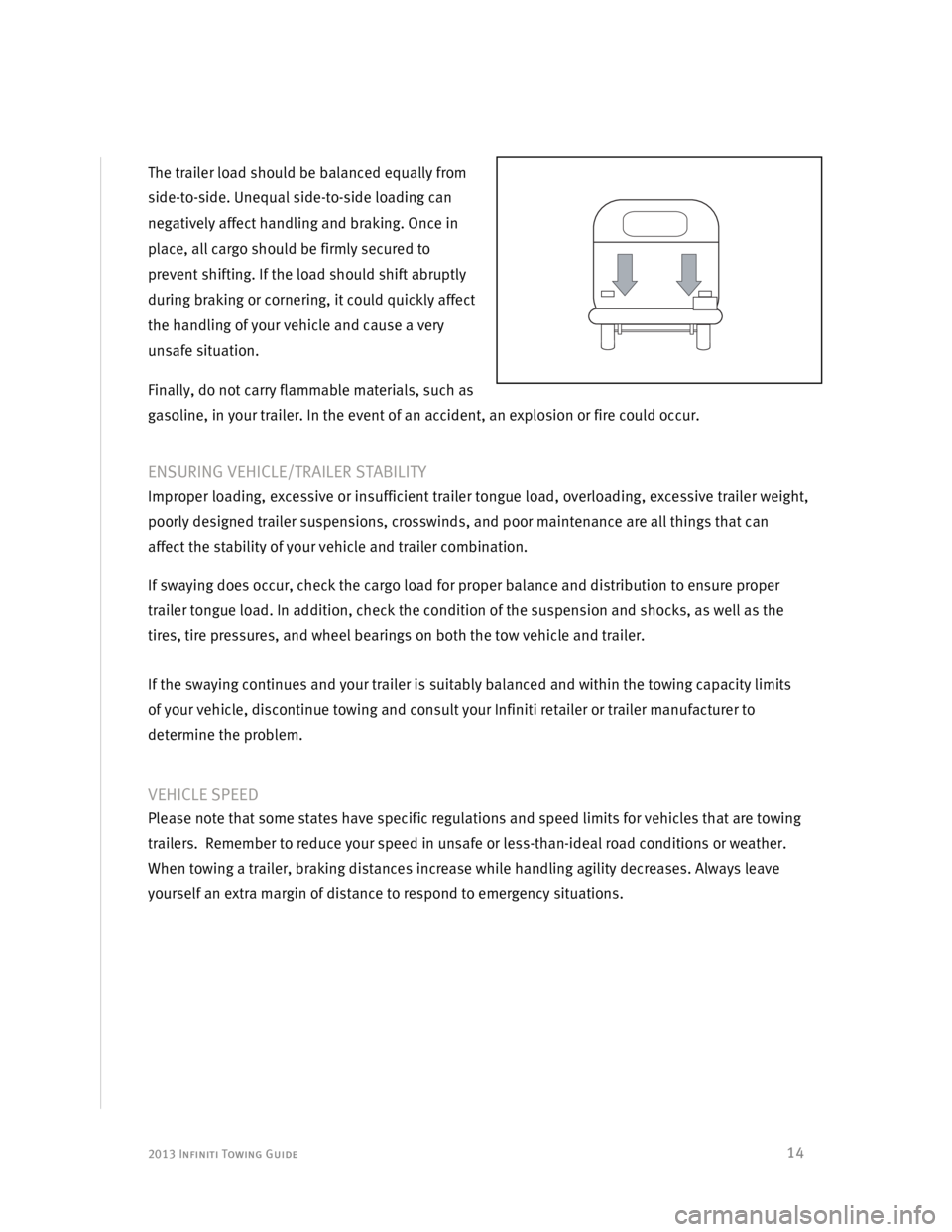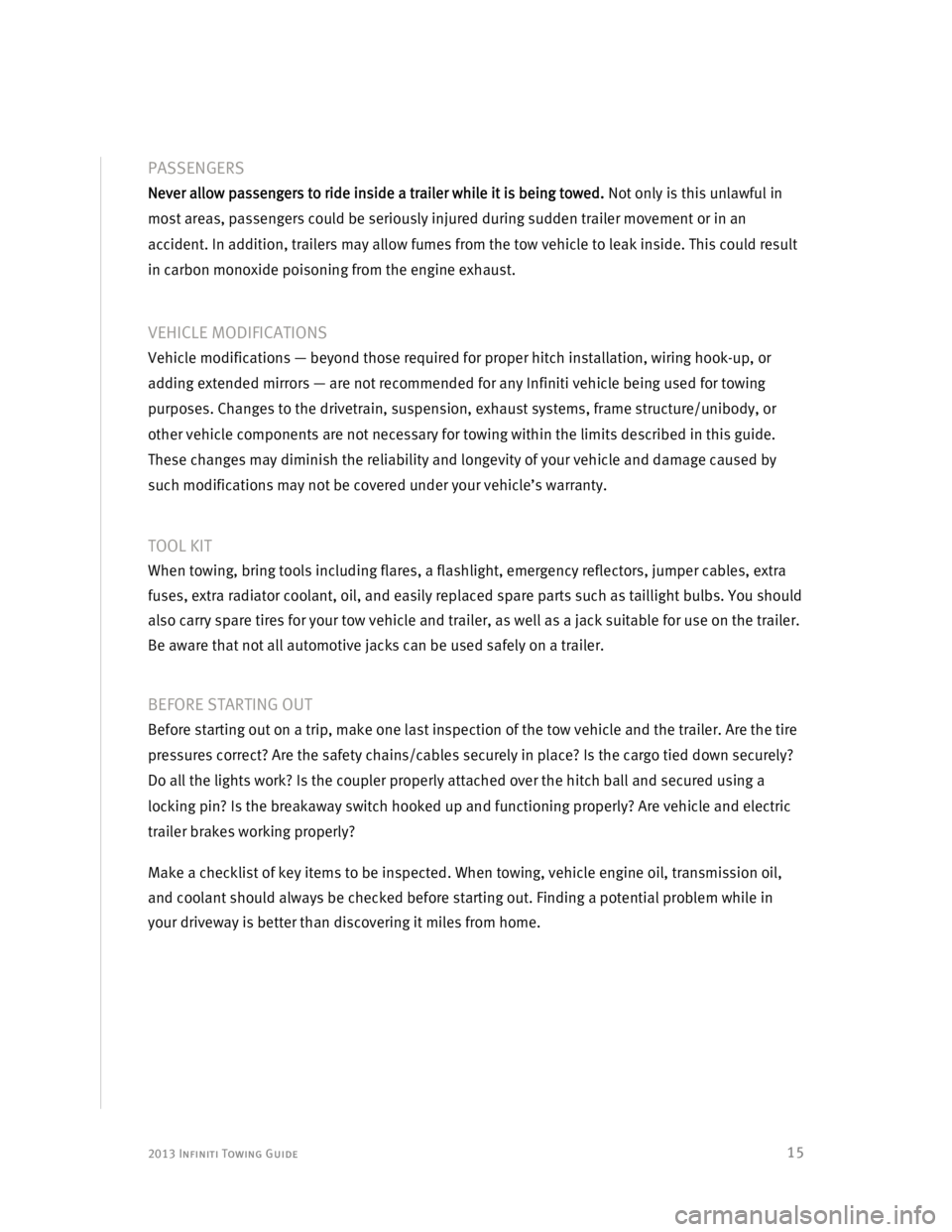suspension INFINITI EX 2013 Towing Guide
[x] Cancel search | Manufacturer: INFINITI, Model Year: 2013, Model line: EX, Model: INFINITI EX 2013Pages: 25, PDF Size: 0.42 MB
Page 2 of 25

2013 Infiniti Towing Guide
1
SAFETY IS PRIORITY ONE
Obviously, your first concern should be safety. Your vehicle was designed to be used primarily to
carry passengers and cargo. Always remember that towing a trailer places additional loads on your
vehicle’s engine, drivetrain, suspension, steering, braking, and other systems. Therefore, be certain
that your vehicle can meet the demands of the towing application you have in mind.
Rent or purchase only the highest-quality towing and safety equipment you can find. Reinforced tow
hitches designed especially for certain Infiniti vehicles are available from your Infiniti retailer.
Hitches for other Infiniti models — if Infiniti recommends towing with that vehicle — should be
bought from and installed by a professional supplier of towing equipment.
Finally, it is important to follow the towing capacity limit set for your specific vehicle and to ensure
that your vehicle is in top mechanical condition, especially the tires, brakes, suspension, and
engine cooling system. See your vehicle owner’s manual for details.
NEVER EXCEED THE ESTABLISHED TOWING CAPACITY
Towing capacities vary from vehicle to vehicle. See the towing information in your vehicle owner’s
manual for the towing capacities of 2013 Infiniti vehicles produced at the time of Towing Guide
publication. Use this data to help select the proper Infiniti vehicle to meet your anticipated towing
needs, and refer to it when towing, renting a trailer or other piece of towing equipment.
EQUIP YOUR INFINITI FOR TOWING
The frequency and type of towing should influence the manner in which you equip your vehicle. If
you plan to tow often, either for recreation or work, select the engine size, transmission type,
suspension, and towing capacity that are best suited to your requirements. This guide can help you
select the proper equipment.
READ THIS GUIDE BEFORE YOU TOW
This guide was designed to provide an overview of safe towing practices. Here, you will find
information on towing equipment, safety, proper loading and driving techniques, towing tips, and
much more.
It is also a good idea to discuss your towing requirements with either your Infiniti retailer or a
professional supplier of towing equipment before you equip your Infiniti vehicle for towing.
Finally, there are state and local laws on towing that you should review to ensure compliance with
all regulations.
Special Note: Do not use your new vehicle to tow a trailer or haul a heavy load for the first 500 miles
(800 km). Your engine, axle or other parts could be damaged. For the first 500 miles that you tow a
trailer, do not drive over 50 mph and do not make starts at full throttle. This helps your engine and
other parts of your vehicle wear in at heavier loads.
INTRODUCTION
Page 15 of 25

2013 Infiniti Towing Guide
14
The trailer load should be balanced equally from
side-to-side. Unequal side-to-side loading can
negatively affect handling and braking. Once in
place, all cargo should be firmly secured to
prevent shifting. If the load should shift abruptly
during braking or cornering, it could quickly affect
the handling of your vehicle and cause a very
unsafe situation.
Finally, do not carry flammable materials, such as
gasoline, in your trailer. In the event of an accident, an explosion or fire could occur.
ENSURING VEHICLE/TRAILER STABILITY
Improper loading, excessive or insufficient trailer tongue load, overloading, excessive trailer weight,
poorly designed trailer suspensions, crosswinds, and poor maintenance are all things that can
affect the stability of your vehicle and trailer combination.
If swaying does occur, check the cargo load for proper balance and distribution to ensure proper
trailer tongue load. In addition, check the condition of the suspension and shocks, as well as the
tires, tire pressures, and wheel bearings on both the tow vehicle and trailer.
If the swaying continues and your trailer is suitably balanced and within the towing capacity limits
of your vehicle, discontinue towing and consult your Infiniti retailer or trailer manufacturer to
determine the problem.
VEHICLE SPEED
Please note that some states have specific regulations and speed limits for vehicles that are towing
trailers. Remember to reduce your speed in unsafe or less-than-ideal road conditions or weather.
When towing a trailer, braking distances increase while handling agility decreases. Always leave
yourself an extra margin of distance to respond to emergency situations.
Page 16 of 25

2013 Infiniti Towing Guide
15
PASSENGERS
Never allow passengers to ride inside a trailer while it is being towed. Not only is this unlawful in
most areas, passengers could be seriously injured during sudden trailer movement or in an
accident. In addition, trailers may allow fumes from the tow vehicle to leak inside. This could result
in carbon monoxide poisoning from the engine exhaust.
VEHICLE MODIFICATIONS
Vehicle modifications — beyond those required for proper hitch installation, wiring hook-up, or
adding extended mirrors — are not recommended for any Infiniti vehicle being used for towing
purposes. Changes to the drivetrain, suspension, exhaust systems, frame structure/unibody, or
other vehicle components are not necessary for towing within the limits described in this guide.
These changes may diminish the reliability and longevity of your vehicle and damage caused by
such modifications may not be covered under your vehicle’s warranty.
TOOL KIT
When towing, bring tools including flares, a flashlight, emergency reflectors, jumper cables, extra
fuses, extra radiator coolant, oil, and easily replaced spare parts such as taillight bulbs. You should
also carry spare tires for your tow vehicle and trailer, as well as a jack suitable for use on the trailer.
Be aware that not all automotive jacks can be used safely on a trailer.
BEFORE STARTING OUT
Before starting out on a trip, make one last inspection of the tow vehicle and the trailer. Are the tire
pressures correct? Are the safety chains/cables securely in place? Is the cargo tied down securely?
Do all the lights work? Is the coupler properly attached over the hitch ball and secured using a
locking pin? Is the breakaway switch hooked up and functioning properly? Are vehicle and electric
trailer brakes working properly?
Make a checklist of key items to be inspected. When towing, vehicle engine oil, transmission oil,
and coolant should always be checked before starting out. Finding a potential problem while in
your driveway is better than discovering it miles from home.